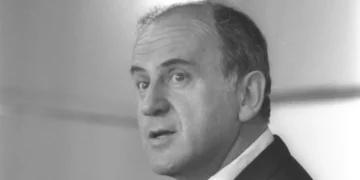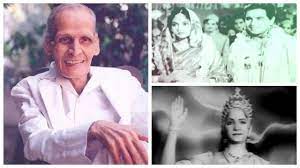Kavi Pradeep, celebrated for his profound lyrics, is best known for crafting some of Bollywood’s most iconic songs. However, his work also served as a reflection of the turbulent political landscape of his time, subtly challenging colonial rule and social inequality.
Two of his most notable songs, “Yahi Paigham Humara” from the film Paigham (1959) and “Aaj Himalay Ki Choti Se” from Kismet (1943), offer more than just musical entertainment—they carry a deeper social and political message. In Paigham, starring Dilip Kumar and Raaj Kumar, the song “Yahi Paigham Humara” appears towards the end of the film, which centers on the relationship between industrialists and workers. The song’s lyrics, “Insaan Ka Insaan Se Ho Bhaichara Yehi Paigam Humara,” promote brotherhood among humans. However, the subsequent lines take a leftist stance, advocating for equality: “Unch neech ka qissa, sab ko mile mehnat ke mutabiq apna apna hissa” and “Har ek mahal se kaho ke jhopadiyon mein diye jalaye. Chhoton aur badon mein ab koi fark na reh jaaye.” The film’s anti-capitalist message resonated with audiences, contributing to the movie’s success.
In Kismet, released during the pre-independence era in 1943, the song “Aaj Himalay Ki Choti Se” was included not because of its relevance to the storyline but because of its powerful lyrics. Set against the backdrop of the Quit India Movement, the song became an anthem of resistance, with theater audiences often demanding encores. The lyrics, “Aaj Himalay ki choti se aaj humne lalkara hai. Door hato ae duniya walon Hindustan humara hai,” stirred patriotic fervor and became a sensation across India.
Mitul Pradeep, Kavi Pradeep’s daughter, shared a lesser-known story behind the song. After its release, Kavi Pradeep received a summons, and a warrant was issued for his arrest. He went underground for a few days, but a British police officer named Dharmendra Gaud intervened. Gaud, familiar with Kavi Pradeep, convinced the British authorities to allow him to speak with the lyricist first. Kavi Pradeep cleverly explained that the lyrics, “Shuru hua hai jung tumhara, jaag utho Hindustani. Ab na kisi ke aage jhukna, German ho ya Japani,” were intended to rally support for the British against their enemies, the Germans and Japanese, during World War II. Gaud was satisfied with this explanation and reassured the British authorities, who ultimately believed that the song was not anti-British. In reality, however, the song was a veiled act of defiance against the colonial rulers—a subtle yet powerful example of Kavi Pradeep’s lyrical genius.
































